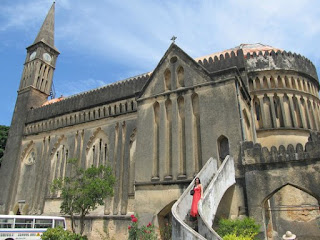Formerly the Church of the Province of Tanzania, the Anglican Church of Tanzania was established as an independent province in 1970, when the former province of East Africa was divided into the province of Kenya and the province of Tanzania. The latter covers the geographical area of the United Republic of Tanzania with 18 dioceses in the mainland and one in the Islands of Zanzibar and Pemba. The Anglican Church of Tanzania has two distinct church traditions - Anglo-Catholic and Evangelical. This is due to the fact that, dating back to the mid-19th century, two British mission societies worked in Tanzania, the Universities' Mission to Central Africa, UMCA (now United Society for the Propagation of the Gospel, USPG), and the Church Missionary Society (CMS, now Church Mission Society).
The highest decision-making body in the ACT is the synod (general assembly). It meets every three years. The standing committee (general council) is the executive body in between synod meetings. There are also the house (council) of bishops, the officers, and board and committees. The ACT has three semi-indepen-dent associations: the Mothers Union (MU), the Tanzania Anglican Youth Organization (TAYO) and the Anglican Evangelistic Association (AEA). Some of the prominent institutions include the theological colleges (St Phillip's located at Kongwa, and St Mark's in Dar es Salaam); Mtumba Rural Women Training Centre, Vocational Training Centre, Central Tanganyika Press and the Literature Organization (also known as the Dar es Salaam Bookshop). Programmes on HIV/AIDS, tuberculosis and malaria, and community development are among the ongoing activities of the church. Two major future projects are to establish a university by the end of 2006, and a nation-wide telecommunications and database network (2005-2007).

No comments:
Post a Comment